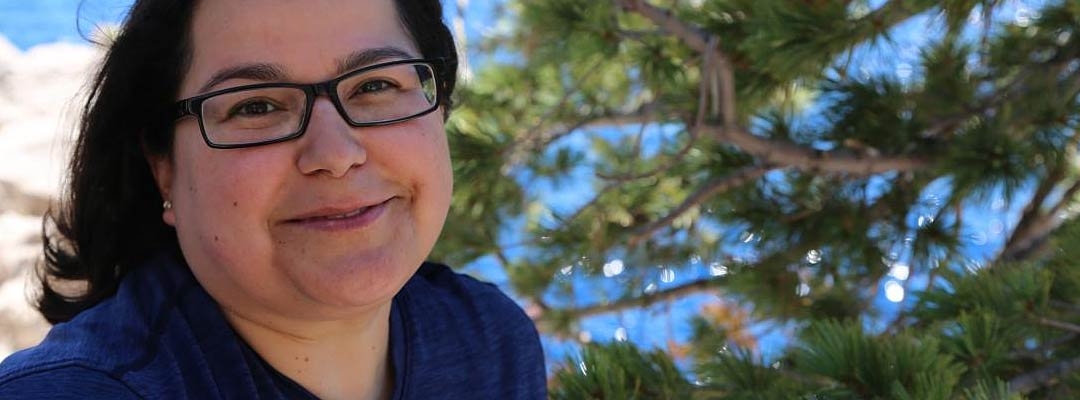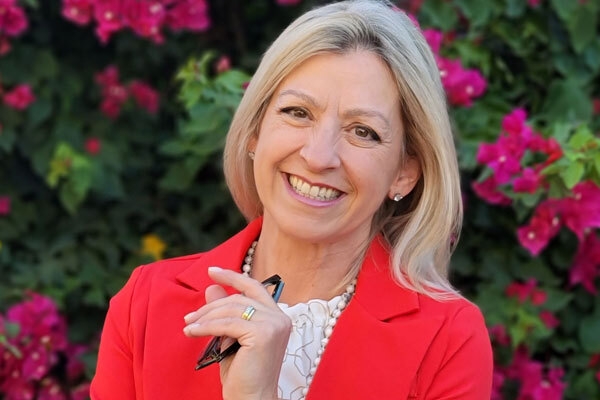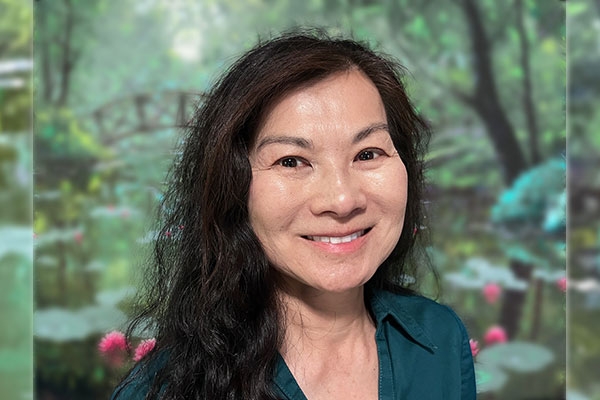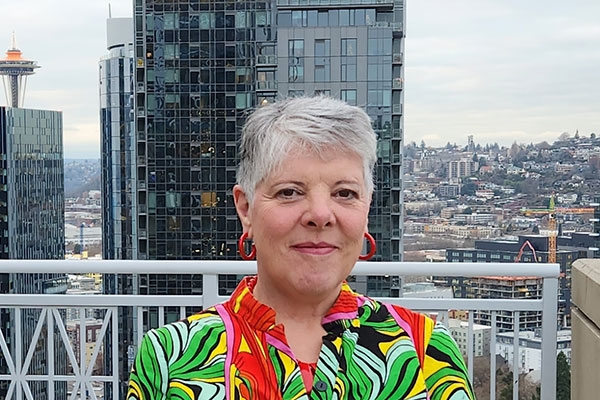“I tell my class on the first day that I have worked at basically every level of education—from elementary school through grad school,” says College Admissions and Career Planning certificate instructor Aubrey Uresti. “I was an elementary before-and-after-school teacher, middle-school and high-school counselor and school-based therapist, a high-school teacher, and I’ve taught undergrads, grads and adult learners.”
So when you walk into Aubrey’s class, you can be sure that you’re learning from a consummate professional. And with this wealth of experience comes concrete, real-world examples to bring the college admissions and career planning curriculum to life.
Well-deserving of being named a 2018 Honored Instructor, Aubrey is passionate about this ever-changing field and the students who are embarking on this career path. Teaching at Extension since 2010, Aubrey has seen changes abound—from the types of students who enter her class to how teachers and counselors interact with their students.
I recently had the pleasure of chatting with Aubrey—who is in the midst of writing her Ph.D. dissertation; more on that later—to find out what makes this instructor tick.
How did you get started teaching at Extension?
Back in 2009, Dr. Suzy Thomas, who is the other instructor for the Counseling Techniques for Educators course that I teach, asked me to come in and be a guest speaker for the course. I started teaching in 2010 based on a recommendation from Career Counseling instructor Steve Pantell. Early on, I was teaching three times a year. Then due to economic downshifts, I began co-teaching the class, and in 2016 we developed an online hybrid version to appeal to a larger audience. We still do the in-person and the hybrid versions, and Suzy and I co-teach both versions. One of the things that I’ve appreciated about Extension is the opportunity to continue teaching with whatever is happening in the economic world.
In recent years, I’ve seen people coming into this program to launch their second, third or even fourth career.
In your classes, what changes have you seen from the time you started as a guest speaker to now?
When I first started teaching at Extension, the typical student was often someone who had a professional career and maybe took some time away to focus on raising a family and do the very difficult work of parenting. And they had experienced the college admissions process with their kids. In doing that, they saw that they were really good at it or were interested in doing that type of work. Our typical student in the beginning was that person looking for a second career in something that was new and different.
In recent years, I’ve seen people coming into this program to launch their second, third or even fourth career. I’ve had people who were straight out of college and people who are in their 60s and 70s. These diverse students are from a wide spectrum in terms of age, gender, socioeconomic, ethnic and racial backgrounds. It’s always exciting to get into the class, and think, “Who am I going to teach today?” And then I’ll adapt my teaching to what the students want and need.
With such a diverse set of students, what is the common attraction to this program?
I hope that part of it is a love for young adults. By teaching people who are going to be in direct service of kids, I hope that I can pass on some of that genuine love for kids.
A lot of the people who come to this program didn’t have the best experience with the college admissions process themselves. I also teach a lot of international students, and it’s very challenging for them to navigate the American college system; there are so many things that are unknown and constantly changing. These students want to make the experience better for the next generation. They see themselves as having survived the system and they want to pass on that knowledge.
Some people also venture into the larger field of education as writing coaches or tutors. As they start working with students and helping them with college-application essays, they realize that there is so much more information that they need in order to support their students in a way that is comprehensive. I think that drives them to take our classes: They want to make a larger impact on their students.
We get so many different types of students from all walks of life—that pushes me as an instructor to keep evolving and growing.
And as your typical student has adapted, so has your curriculum with the launch of a hybrid online classroom course.
One of the reasons why we pushed for hybrid as opposed to just online is because the in-person component is so important. As an instructor, there is a pedagogical and ethical component to teach people the essential counseling skills of empathy and reflective listening. That should happen face-to-face.
It’s great to have the online portion where students can read about counseling theories and interact with each other and their instructors. But then we still have that in-person component where we can spend time practicing counseling skills and talk more about the “heavier” issues: suicide, eating disorders, substance abuse and addictions.
Wrapping my head around how to teach my class online was a lot of fun. One of the things I love about Extension is we get so many different types of students from all walks of life—that pushes me as an instructor to keep evolving and growing.
You also teach undergraduate students at UC Davis. Do you see any similarities between teaching undergraduates compared to adult learners?
There are some similarities in that the students have a pure and genuine love of the material. Students are signing up for my course because they want to be in it. It’s an active audience to teach.
The difference is that the undergraduates are looking at their next steps. They might be thinking about a career path or grad school path.
Extension students know what they want: They want to receive the certificate, build their private practice or work at a private high school’s college and career center. One of the fun things I’ve seen over the years with the adult learners at Extension is they’ll complete the certificate and maybe six months to a year or two years afterward, I’ll get an email from them saying, “I’ve been doing this work and I love it. I really want to go back to school and get my master’s in counseling and start working in the counseling field.”
There’s still that piece of lifelong learning that is really appealing to me.
I’m proud to teach in the program; I hope the students have that same pride.
Speaking of lifelong learning: You’re pursuing your Ph.D.!
I’m a Ph.D. candidate at the UC Davis School of Education. I was actually just saving and backing up my dissertation!
My dissertation focuses on middle-school students who have had the experience of a parent or significant caregiver who is incarcerated. I look at the behavioral, academic and psychosocial outcomes of these students at the individual, family and extended-family levels.
This comes out of my work as a school counselor and having taught at county jail. I saw so much grief and loss for young folks and families. And I was aware of the stigma and shame that many families endure and that may keep them from seeking help and support. I’ve had these questions:
- What do students say works for them?
- How can counselors help?
- What works?
- What can we do to make the student’s life better and richer and to provide more support?
How can we bring students to the U.S. in a responsible way and really care for them when they’re here.
You need to balance receiving your Ph.D. and keeping up with trends in the field. What changes have you seen?
One of the things that have become increasingly important is for universities to appeal to an international population in a way that is supportive and culturally relevant and culturally competent. I’ve seen how much work is going into thoughtful planning for international populations.
This past January, I taught a week-long intensive Extension course, where we had high school counselors, teachers and administrators from China learning about how they can better support their students in coming to the U.S. I expect to see more of this: How can we bring students to the U.S. in a responsible way and really care for them when they’re here.
There has also been a change in discourse and recognition of individuals and identity in ways that I didn’t see in education 10 years ago. People are trying to be really respectful with language, using inclusive language and pronouns, as one example.
You’re obviously dedicated to this field and our students. What keeps you teaching with us?
We have such a comprehensive program for folks to learn how to do this very complicated work in a way that prepares them to be grounded in theory and that provides practical strategies and applications—and that makes them very caring college advisers and career planners.
I hope that the love they have for what they do and the people they work with just shines through. I’m proud to teach in the program; I hope the students have that same pride.



